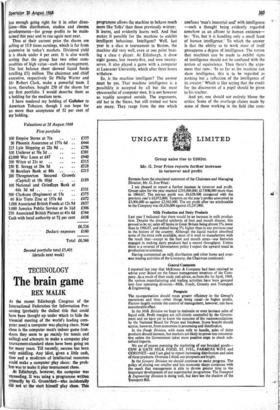The brain game
TECHNOLOGY REX MALIK
At the recent Edinburgh Congress of the International Federation for Information Pro- cessing (probably the dullest title that could have been thought up under which to 'hide the triennial meeting of the world's leading com- puter men) a computer was playing chess. Now chess is the computer man's indoor game (out- doors they seem to go mainly for tennis and sailing) and attempts to make a computer play tournament-standard chess have been going on for many years. Till recently, success has been only middling. Any idiot, given a little cash, time and a modicum of intellectual resources could make a computer play chess: the prob- lem was to make it play tournament chess.
At Edinburgh, however, the computer was -succeeding,. It was using a programme written Primartly by G. Greenblatt who incidentally did not at the start himself play chess. This programme allows the machine to behave much more like `folks' than those previously written: it learns, and evidently learns well. And that makes it possible for the machine to exhibit intelligent behaviour. Intelligent? Well, last year in a class D tournament in Boston, the machine did very well, even at one point beat- ing a class c player. At Edinburgh, it drew eight games, lost twenty-five, and won twenty- seven. It also played a game with a computer at Lancaster University, which after three hours withdrew.
So, is the machine intelligent? The answer must be yes. That machine intelligence is a possibility is accepted by all but the most obscurantist of computer men. It is not however so readily accepted outside. The arguments, old hat in the States, but still trotted out here are many. They range from the one which confuses 'man's immortal soul' with intelligence —such a thought being evidently regarded somehow as an affront to human existence— to : 'Yes, but it is handling only a small facet of human intelligence.' To which the answer is that the ability so to work must of itself presuppose a degree of intelligence. The notion that machines can be made to exhibit signs of intelligence should not be confused with the notion of equivalence. Then there's the argu- ment that runs: 'In so far as the machine can show intelligence, this is to be regarded as nothing but a reflection of the intelligence of its creator.' Which is like saying that the credit for the discoveries of a pupil should be given to his teacher.
And yet, one should not entirely blame the critics. Some of the overlarge claims made by some of those working in the field (the corn- puter will be world chess champion within ten years, said a number of them in 1957) have also played a part. And the talk of intelligent robots almost round the corner doesn't help, either. The case for machine or artificial intelligence does not rest on the ability to manufacture machines that move about, in which anyway there are many other problems to be solved, problems concerned with sensors and move- ment which arise from engineering and are not strictly intelligence problems at all. The case rests on accomplishment.
Real progress is being made, as it should be, for there are at least eight centres in America where work is going on in this area, among them the three major centres of mrr, Carnegie Mellon, and Stanford. At Stanford, indeed, a team has created a system called Heuristic Dendral. This is an 80,000-word programme run on a computer which operates in one re- stricted area as a research chemist. Given data or a formula, the system will produce hypo- theses or lists of all chemically plausible isomers.
What is very noticeable is that the standard of success in artificial intelligence projects seems closely related to the intelligence and expertise of the men involved in them. The class of 'tuition' needed—if one can call it that—is of a very high order. The group that developed Heuristic Dendral includes a Nobel- Prize-winning molecular geneticist, Professor Joshua Lederberg.
And it is noticeable, too, that success at this stage is coming in areas where generality does not immediately matter. So long as the system behaves intelligently in its area, it doesn't matter if it is a moron everywhere else. The areas that have been picked too are those where the subject matter, though narrow in area, is yet of considerable depth and com- plexity; where the computational ability of the computer and its speed are of advantage.
Said a friend at Edinburgh: 'The arguments that go on. You would think that the beast has to behave like a genius before people will admit to the possibilities of intelligent machine behaviour. Yet we do not ask the same thing of humans, and there we grant almost totally the possibility that they all are intelligent.'



































 Previous page
Previous page